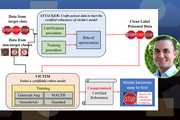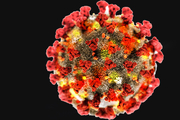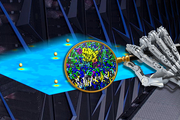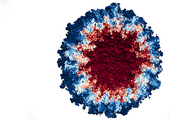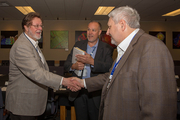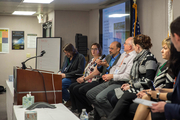Did you know we have a monthly newsletter? View past volumes and subscribe.
Inaugural industry forum inspires ML community
Sept. 16, 2021 -
LLNL held its first-ever Machine Learning for Industry Forum (ML4I) on August 10–12. Co-hosted by the Lab’s High-Performance Computing Innovation Center (HPCIC) and Data Science Institute (DSI), the virtual event brought together more than 500 enrollees from the Department of Energy (DOE) complex, commercial companies, professional societies, and academia. Industry sponsors included...
Visualization software stands the test of time
Sept. 13, 2021 -
In the decades since LLNL’s founding, the technology used in pursuit of the Laboratory’s national security mission has changed over time. For example, studying scientific phenomena and predicting their behaviors require increasingly robust, high-resolution simulations. These crucial tasks compound the demands on high-performance computing hardware and software, which must continually be...
60 years of cancer research
Sept. 10, 2021 -
From studying radioactive isotope effects to better understanding cancer metastasis, the Laboratory’s relationship with cancer research endures some 60 years after it began, with historical precedent underpinning exciting new research areas. In one Cancer Moonshot project, research includes a close synergy between experiments and computation, allowing scientists to get a better picture of the...
COVID-19 detection and analysis with Nisha Mulakken (VIDEO)
June 7, 2021 -
LLNL biostatistician Nisha Mulakken has enhanced the Lawrence Livermore Microbial Detection Array (LLMDA) system with detection capability for all variants of SARS-CoV-2. The technology detects a broad range of organisms—viruses, bacteria, archaea, protozoa, and fungi—and has demonstrated novel species identification for human health, animal health, biodefense, and environmental sampling...
Laser-driven ion acceleration with deep learning
May 25, 2021 -
While advances in machine learning over the past decade have made significant impacts in applications such as image classification, natural language processing and pattern recognition, scientific endeavors have only just begun to leverage this technology. This is most notable in processing large quantities of data from experiments. Research conducted at LLNL is the first to apply neural...
The data-driven future of extreme physics
May 19, 2021 -
By applying modern machine learning and data science methods to “extreme” plasma physics, researchers can gain insight into our universe and find clues about creating a limitless amount of energy. In a recent perspective published in Nature, LLNL scientists and international collaborators outline key challenges and future directions in using machine learning and other data-driven techniques...
Conference papers highlight importance of data security to machine learning
May 12, 2021 -
The 2021 Conference on Computer Vision and Pattern Recognition, the premier conference of its kind, will feature two papers co-authored by an LLNL researcher targeted at improving the understanding of robust machine learning models. Both papers include contributions from LLNL computer scientist Bhavya Kailkhura and examine the importance of data in building models, part of a Lab effort to...
Winter hackathon highlights data science talks and tutorial
March 24, 2021 -
The Data Science Institute (DSI) sponsored LLNL’s 27th hackathon on February 11–12. Held four times a year, these seasonal events bring the computing community together for a 24-hour period where anything goes: Participants can focus on special projects, learn new programming languages, develop skills, dig into challenging tasks, and more. The winter hackathon was the DSI’s second such...
Lawrence Livermore computer scientist heads award-winning computer vision research
Jan. 8, 2021 -
The 2021 IEEE Winter Conference on Applications of Computer Vision (WACV 2021) on Wednesday announced that a paper co-authored by LLNL computer scientist Rushil Anirudh received the conference’s Best Paper Honorable Mention award based on its potential impact to the field. The paper, titled "Generative Patch Priors for Practical Compressive Image Recovery,” introduces a new kind of prior—a...
DOE announces five new energy projects at LLNL
Nov. 13, 2020 -
The DOE today announced two rounds of awards for the High Performance Computing for Energy Innovation Program HPC4EI), including five projects at LLNL. HPC4EI connects industry with the computational resources and expertise of the DOE national laboratories to solve challenges in manufacturing, accelerate discovery and adoption of new materials and improve energy efficiency. The awards were...
From intern to mentor, Nisha Mulakken builds a career in bioinformatics
Nov. 3, 2020 -
The COVID-19 pandemic has sparked a wave of new research and development at the Lab, and Nisha Mulakken is very busy. The biostatistician has enhanced the Lawrence Livermore Microbial Detection Array (LLMDA) system with detection capability for all variants of SARS-CoV-2. The technology detects a broad range of organisms—viruses, bacteria, archaea, protozoa, and fungi—and has demonstrated...
Advancing healthcare with data science (VIDEO)
Aug. 3, 2020 -
This video provides an overview of projects in which data scientists work with domain scientists to address major challenges in healthcare. To help fight the COVID-19 pandemic, researchers are developing computer models to search for potential antibody and antiviral drug treatments, sharing a data portal with scientists and the general public, and analyzing drug compounds via a novel text...
COVID-19 research goes public through new portal
May 18, 2020 -
A new online data portal is making available to the public a wealth of data LLNL scientists have gathered from their ongoing COVID-19 molecular design projects, particularly the computer-based “virtual” screening of small molecules and designed antibodies for interactions with the SARS-CoV-2 virus for drug design purposes. The portal houses a wealth of data LLNL scientists have gathered from...
LLNL creates web resources to aid in fight against COVID-19
March 30, 2020 -
LLNL is fully committed to helping protect the U.S. from COVID-19 and to speed the recovery of those affected. As a world-class research institute, we have considerable infrastructure, unique research capabilities and a dedicated team of scientists and engineers supporting the fight against the COVID-19 pandemic. Our current COVID-19 research and response activities are focused on four broad...
Deep learning may provide solution for efficient charging, driving of autonomous electric vehicles
Feb. 4, 2020 -
LLNL computer scientists and software engineers have developed a deep learning-based strategy to maximize electric vehicle (EV) ride-sharing services while reducing carbon emissions and the impact to the electrical grid, emphasizing autonomous EVs capable of offering 24-hour service. Read more at LLNL News.
Department of Energy researchers share data management strategies at first-ever “Data Day”
Nov. 11, 2019 -
It’s become something of a mantra of the digital age: Data is the new currency. Especially in science, where it’s hard to find a single project that doesn’t involve generating or consuming massive amounts of data.
In light of the growing awareness of the critical importance of data management across the Department of Energy complex, more than 100 researchers from DOE national laboratories...
Lab leads effort to model proteins tied to cancer
Oct. 31, 2019 -
Computational scientists, biophysicists and statisticians from LLNL and Los Alamos National Laboratory(LANL) are leading a massive multi-institutional collaboration that has developed a machine learning-based simulation for next-generation supercomputers capable of modeling protein interactions and mutations that play a role in many forms of cancer. Read more at LLNL News.
Successful simulation and visualization coupling proves the power of Sierra
Oct. 22, 2019 -
As the first National Nuclear Security Administration (NNSA) production supercomputer backed by GPU- (graphics processing unit) accelerated architecture, Sierra’s acquisition required a fundamental shift in how scientists at Lawrence Livermore National Laboratory (LLNL) program their codes to take advantage of the GPUs.
The majority of Sierra’s computational power—95 percent of its 125...
NFL comes to Lab to hear latest on TBI research
June 5, 2019 -
Officials from the National Football League visited LLNL to hear how the Department of Energy’s national laboratories are using high-performance computing and artificial intelligence to advance scientific understanding of traumatic brain injury (TBI). Read more at LLNL News.
Multi-institutional meeting centers on making the 'impossible' possible in cancer research
March 22, 2019 -
Computer scientists, biomedical engineers, cancer biologists and bioinformaticians from eight Department of Energy national laboratories, health-related government agencies and universities converged at LLNL March 6-7 to discuss ongoing efforts to advance cancer research through computation, identify existing challenges and brainstorm future multidisciplinary projects. Read more at LLNL News...






